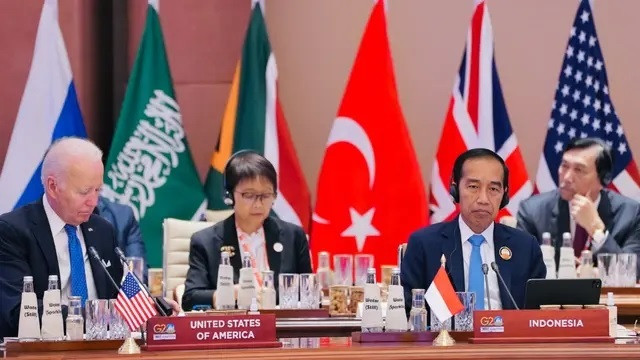Popular Reads
Top Results
Can't find what you're looking for?
View all search resultsPopular Reads
Top Results
Can't find what you're looking for?
View all search resultsForeign policy matters in 2024
Voters, and the public will continue to be alienated from our foreign and defense policies, which are supposed to represent or protect the interests of the nation.
Change text size
Gift Premium Articles
to Anyone

General elections in Indonesia are rarely, if ever, about our foreign policy, so it was good to see the three presidential candidates separately address this issue in their foreign policy speeches at the Centre for Strategic and International Studies (CSIS) during the past week. Sadly, they failed to inspire or impress. Prabowo Subianto, Ganjar Pranowo and Anies Baswedan presented some interesting initiatives and ideas on foreign and defense policies, but nothing that we could describe as a major departure from the current path.
In contrast, incumbent President Joko “Jokowi” Widodo, who was widely dismissed as a foreign policy novice when he was first elected in 2014, had more fresh and welcoming ideas in his campaign that were seen at the time as radical by Indonesia’s standards.
Jokowi campaigned to turn Indonesia from an archipelagic into a maritime nation, projecting its power as a responsible nation that protects and safeguards the strategic waters in and around the country, and in the Indo-Pacific region under what he called the global maritime fulcrum. Sadly, this idea did not catch on because of resistance from within the foreign policy and defense establishments, unaccustomed as they are to big changes.
The 2024 election is an opportunity for Indonesia to rethink its foreign and defense policies considering the dramatic changes that have happened both externally and internally. The Indo-Pacific has become a much more dangerous region, with territorial disputes in the South China Sea and the escalating tensions between the United States and China.
Internally, Indonesia has changed, now a middle power, economically and politically, it has more clout and influence. There is a growing expectation around the world that Indonesia could play a more active role in international diplomacy. Yet, it is still business as usual with Indonesia and it continues to punch below its weight.
Our foreign policy design has rarely changed since the Soeharto days. Some concepts need rethinking. The belief that ASEAN is the “cornerstone” of foreign policy has become a straitjacket since the 10-nation group moves by consensus and there is now a lot of disunity. The non-alignment that evolved during the Cold War needs a new 21st century interpretation.

If a war erupts in the region, Indonesia is vulnerable, with its military having less than 70 percent of what it considers to be the minimum essential force to protect our territories and sovereignty. Yet none of the presidential candidates talked about increasing defense spending, now at a meager 0.8 percent of gross domestic product, far below the 2 percent achieved by neighboring countries.
Some may say Indonesia is leaning closer to China politically and economically, while leaning toward the US in defense as a reflection of its independent foreign policy. Others would argue, however, that our foreign and defense policies are simply following different paths. Whichever argument you take, there is a clear need for the defense establishment, which in the past dealt primarily with internal threats, to take a seat at the foreign policy table.
Foreign policy should no longer be the monopoly of the Foreign Ministry. The 2024 presidential election is a good opportunity for candidates to raise public interest in foreign and defense policies.
All three presidential candidates dedicate a special section on foreign and defense policy in their published vision and mission statements.
But in the absence of any new initiatives, they are unlikely to use them in their election campaigns. Voters and the public will continue to be alienated from our foreign and defense policies, which are supposed to represent or protect the interests of the nation.
In a time of growing regional tensions and the threat of conflict, the government will need all the support it can get from the people. The next president should prepare the nation early in anticipation of this. There is still time to tweak their foreign policy plans and strategies to inspire people.
May the candidate with the best foreign policy strategy win.










